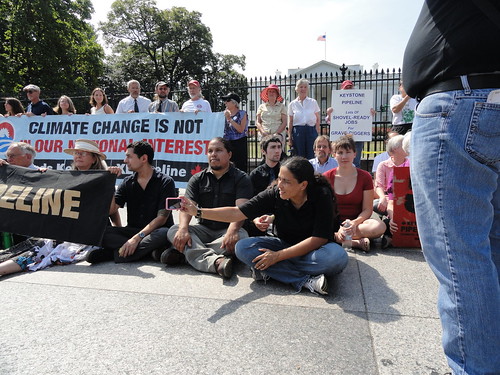Gulf Protesters; Don't Send Us Your Dirty Tar Sands Oil Too
More than a year after the BP well was plugged, Gulf coast residents now face an oil threat from a new direction; a proposed 1700-mile pipeline that would provide a steady stream of raw Canadian tar sands crude from Alberta to huge polluting refineries in Texas. That’s raised the ire of Gulf residents who refuse to be the dumping ground for more dirty and dangerous oil industry operations.
Yesterday they made made their case public on the steps of the White House when three pipeline protesters from the Gulf were arrested then later released. A Gulf contingent traveled to Washington this week to join the headline-grabbing two-week protest against the proposed Keystone XL pipeline, a massive construction project that would wind through the heartland of America, threatening pristine aquifers and environmentally sensitive areas from Montana to Texas.
Tar sands oil operations are one of the dirtiest and most environmentally destructive means of extracting oil. Increasing these operations would increase climate-changing greenhouse gases and wreck havoc on environmentally sensitive areas and local populations that depend on them. The Washington protests have gained international attention as more than 220 people have been arrested. These include ranchers and businessmen concerned about the impacts on their land to celebrities like Margot Kidder.
Houston resident Bryan Parras was one of them. As a board member of the community environmental justice group TEJAS, Bryan has been fighting the chemical industry pollution for years in a region loaded with petrochemical complexes and some of the most polluted air in the country. Sending dirty tar sands oil to his working class community is not what they need, Parras said yesterday through a press release.
"I would challenge President Obama to justify allowing this to happen, given he has just signed a Memo of Understanding with multiple federal agencies to specifically address environmental justice (EJ) issues. This pipeline will impact native communities, low income communities and communities of color. Those are EJ communities."

Gulf tar sands protesters in front of White House shortly before arrests Photo: Karen Savage
Members of the Gulf fishing community also attended the protest. Paul Nelson, president of the South Bay Communities Alliance and a commercial shrimp fisherman from Coden, AL, says he's had enough of politicians' false promises. Nelson says protests like this one are key to communicating public concerns that often take a back seat to powerful business interests--and to the politicians who take their "scoop net full of money." It's time for the world to hear a different message, he says, one that changes the focus from profits made today to the consequences of failed policies tomorrow.
“It’s seek and destroy, and these companies have no conscience about it. It’s all about what they can get today. Down in the gulf, we’re dealing with the safety of people versus tourism. It’s a disgrace. But fishermen like me who know what’s going on in these waters don’t think it’s safe. I’ve already lost my way to make a living. I can’t catch the seafood now and tell you it’s safe.”
The truth of what’s happening in the Gulf—and in the dirty tar sands region of western Canada—share a common story that plague communities from the Canadian border to the Gulf. Politicians everywhere pay more attention to the oil company dollars stuffed in their pockets than the health and welfare of constituents and future generations. It’s an old saw repeated time and time again.
But maybe, just maybe, this time will be different. Perhaps the voices of protest at the White House gates will convince the powers that be that this dangerous tar sands pipeline proposal has finally crossed the line. People in the Gulf and across the country have stood up and made their voices heard loud and clear. Now it's up to the politicians to prove who they really represent.
